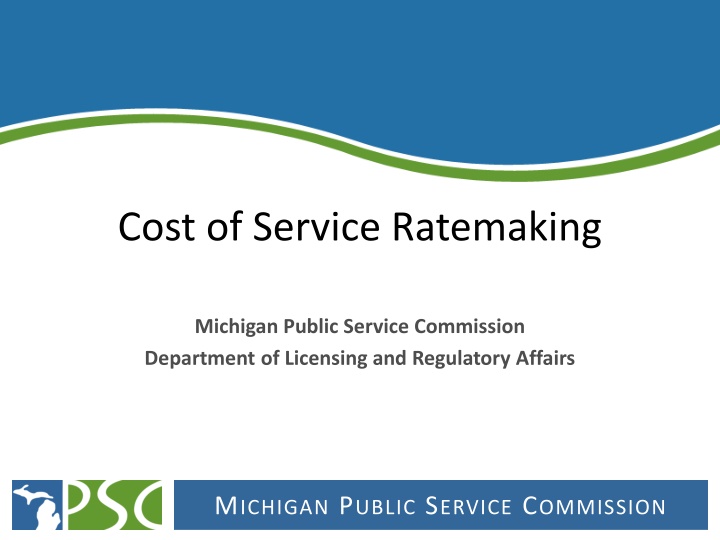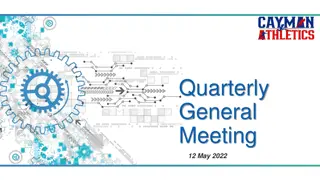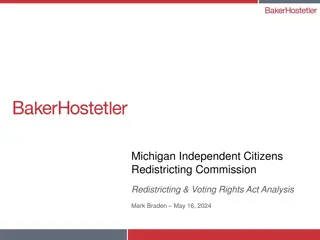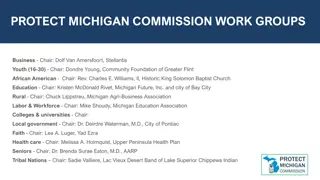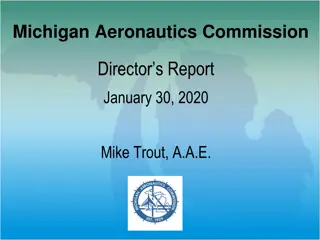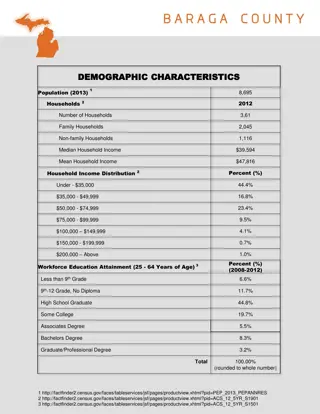Michigan Public Service Commission - Rate Setting and Regulation Process
The Michigan Public Service Commission oversees the rate setting and regulation process for electric utilities in Michigan. This involves determining revenue requirements, allocating costs to customer classes, conducting cost of service studies, and designing rates to recover costs. The commission also manages the general rate case process, where rate increase requests are scrutinized through contested case proceedings before final rates are determined. Additionally, the traditional ratemaking process and revenue requirement formulas are used to calculate rates and ensure fair pricing for customers.
Download Presentation

Please find below an Image/Link to download the presentation.
The content on the website is provided AS IS for your information and personal use only. It may not be sold, licensed, or shared on other websites without obtaining consent from the author.If you encounter any issues during the download, it is possible that the publisher has removed the file from their server.
You are allowed to download the files provided on this website for personal or commercial use, subject to the condition that they are used lawfully. All files are the property of their respective owners.
The content on the website is provided AS IS for your information and personal use only. It may not be sold, licensed, or shared on other websites without obtaining consent from the author.
E N D
Presentation Transcript
Cost of Service Ratemaking Michigan Public Service Commission Department of Licensing and Regulatory Affairs MICHIGAN PUBLIC SERVICE COMMISSION
Regulation Status of Michigan Electric Utilities 8 Investor-Owned Electric Utilities (regulated by MPSC) 9 Cooperative Electric Utilities 3 rate-regulated by MPSC 6 member-regulated 41 Municipal Electric Utilities (not regulated by MPSC) MICHIGAN PUBLIC SERVICE COMMISSION
General Rate Case Process Request for rate increase initiated by utility Provides MPSC Staff, other interveners (Attorney General, ABATE, MCAAA, MEC, etc.) ability to scrutinize requests through contested case proceeding MPSC determines final rates MICHIGAN PUBLIC SERVICE COMMISSION
Rate Development Determination of Revenue Requirement (cost assessment) for a test year Allocation of Costs to customer classes based on usage patterns Cost of service study Rate Design to recover costs through rates and charges MICHIGAN PUBLIC SERVICE COMMISSION
The Traditional Ratemaking Process Revenue Requirement Cost Allocation Rate Design (prices) MICHIGAN PUBLIC SERVICE COMMISSION
Revenue Requirements Formula: RR = r(RB) + E + D + T RR (ratemaking) = r(RB) + E + D + T Other Revenue MICHIGAN PUBLIC SERVICE COMMISSION
Revenue Requirements Formula: Revenue Deficiency = r(RB) + E + D + T Other Revenue Current Revenue Revenue Deficiency = RR (ratemaking) - Current Revenue Therefore, RR(ratemaking) = Current Revenue + Revenue Deficiency MICHIGAN PUBLIC SERVICE COMMISSION
REVENUE REQUIREMENT FORMULA Revenue Requirements=r(RB) + E + D + T r = overall rate of return RB = rate base E = operating expense D = depreciation and amortization T = taxes MICHIGAN PUBLIC SERVICE COMMISSION
RATE BASE Rate base = net plant + working capital (from the balance sheet) MICHIGAN PUBLIC SERVICE COMMISSION
The Traditional Ratemaking Process Revenue Requirement Cost Allocation Rate Design (prices) MICHIGAN PUBLIC SERVICE COMMISSION
Cost Allocation A class cost of service study is a study in which the total company cost of service (revenue requirement) is spread or allocated to customer classes. Customer Class or Class of Service A set of customers with similar characteristics who have been grouped for the purpose of setting an applicable rate for electric service Common classifications include residential, commercial, primary service and industrial The allocation of the total company cost of service to the individual customer classes can provide a revenue requirement target for each customer class, so that each class of customers pays the costs that the utility incurs to serve that class. MICHIGAN PUBLIC SERVICE COMMISSION
Cost of Service Study Steps Functionalization: costs broken down into production, transmission, distribution Classification: costs classified by customer, energy, demand Allocation: costs allocated to different customer classes residential, commercial, industrial MICHIGAN PUBLIC SERVICE COMMISSION
CostFunctionalization Poles, Towers, Fixtures Meters Backbone & Inter-tie Facilities Subtransmission Plant Fuel Costs Generation Step-Up Facilities Line Purchased Power Production Plant Costs Transformers Distribution Production Transmission MICHIGAN PUBLIC SERVICE COMMISSION
Functionalization to Classification Distribution Production Transmission Poles, towers, fixtures Line transformers Meters Station Equipment Production Plant Fuel costs Purchased Power Backbone & Inter-tie Facilities Generation Step-up Facilities Subtransmission Plant Purchased Power Production Plant Demand & Energy Line transformers Poles, towers, fixtures Demand & Customer Demand & Energy Transmission costs are charged to utilities based on MISO schedules, some of which are based on demand, some on energy. Demand Production Plant Demand Station Equipment Energy Fuel costs Customer Meters
Classification to Allocation Classified Distribution Costs Classified Production Costs Charged Transmission Costs Allocate Residential Commercial Industrial
Classified Distribution Costs Classified Production Costs Charged Transmission Costs Allocate Cost Allocation Allocation Factor Function Residential Commercial Industrial % Production Plant + Purchase % % Demand & Energy Production Energy % % % Fuel Purchase Transmission % Transmission % % Demand & Energy Demand % Wires % % Distribution Customer % Meters % %
5am Total Load by Class Contribution to Peak by Class (MW) Industrial Commercial Residential Residential 40% Industrial 43% 8,000 7,000 6,000 Commercial 17% 5,000 5pm Total Load by Class 4,000 3,000 2,000 Industrial 27% 1,000 - 1 2 3 4 5 6 7 8 9 10 11 12 13 14 15 16 17 18 19 20 21 22 23 24 Residential 58% Commercial 15% Consumers Energy Load Data from July 5th, 2010 MICHIGAN PUBLIC SERVICE COMMISSION
5am Total Load by Class Residential 25% Contribution to Peak by Class (MW) Industrial Commercial Residential Industrial 54% 4,500 Commercial 21% 4,000 3,500 3,000 5pm Total Load by Class 2,500 2,000 1,500 Residential 23% 1,000 500 - Industrial 51% 1 2 3 4 5 6 7 8 9 10 11 12 13 14 15 16 17 18 19 20 21 22 23 24 Commercial 26% Consumers Energy Load Data from April 14th, 2010 MICHIGAN PUBLIC SERVICE COMMISSION
Consumers Energy Case No. U-17087 Example Total Revenue Requirement: $4 Billion Cost Allocation Across 3 Rate Classes Residential 43.6% Commercial 25.6% Industrial 30.8% Class Requirement: $1.8 Billion Class Requirement: $1 Billion Class Requirement: $1.2 Billion
PA 286 of 2008 Sec. 11(1) requires MPSC to move to cost-of- service rates ( de-skewing ) By Oct. 6, 2013 for DTE and Consumers (deadline met) Electric rates for other companies moved toward cost of service Limits ability to approve special contracts or rates Unique to Michigan MICHIGAN PUBLIC SERVICE COMMISSION
The Traditional Ratemaking Process Revenue Requirement Cost Allocation Rate Design (prices) MICHIGAN PUBLIC SERVICE COMMISSION 11 of 79
Ratemaking Process Cost allocation determines how many dollars to collect from various classes or services Rate design determines how to collect dollars from various customer groups and services In principle, costs should be recovered through charges matching their classification and functionalization fixed costs, however, are often recovered through usage charges (particularly for residential and other small customers) MICHIGAN PUBLIC SERVICE COMMISSION
Pricing Attributes Dr. James C. Bonbright in his book Principles of Public Utility Rates (1961), which is often quoted by rate design witnesses, provides a list of eight traditional rate-making or pricing attributes: Simplicity and public acceptability Freedom from controversy Revenue sufficiency Revenue stability Stability of rates Fairness in apportionment of total costs Avoidance of undue rate discrimination Encouragement of efficiency MICHIGAN PUBLIC SERVICE COMMISSION
Determining How Costs Will be Recovered From Customers Within Each Customer Class Customer Charge Covers basic fixed cost of serving a customer (e.g., cost of customer hook-up) Meter reading, billing, etc. Charge for basic facilities used to provide service Capacity or Demand Charge Covers cost imposed on the system by the user s maximum load or usage Usually excluded for residential service Usage Charge Covers incremental cost of each unit of service MICHIGAN PUBLIC SERVICE COMMISSION
Rate Design Michigan employs a three step structure: Power Supply Charges : Charge for on each unit of sale (kWh or MWh). Charge for each unit of demand (KW or MW) for larger commercial and industrial customers Delivery Charges: Customer Charge Fixed monthly charge. Distribution Charge per kWh Energy (and Demand for some Commercial & all Industrial rates) charge on each unit of sale. Surcharges: Power Supply Cost Recovery Reconciliation for self-implemented rates Funding for low income assistance, Renewable Energy, and Energy Efficiency programs MICHIGAN PUBLIC SERVICE COMMISSION
DTE Residential Rate Example Residential (D1) 650 kWh Distribution Charges Service Charge Delivery Distribution Charge Surcharges VHWF LIEAF Surcharge EOS RRA NDS SBC SBTC $6.00 $6.00 32.52 $0.0500300 -$1.59 $0.99 -$1.59 $0.99 1.78 2.09 0.51 2.96 1.96 $0.0027330 $0.0032080 $0.0007780 $0.0045600 $0.0030200 Power Supply Charges Energy Charge 1st 510 (17kwh*30Days) Excess Surcharges REPS PSCR $0.0691200 $0.0825700 35.25 11.56 $0.43 $0.43 0.65 $95.10 $0.1463 $0.0010000 Bill $$/kWh MICHIGAN PUBLIC SERVICE COMMISSION
DTE Commercial Rate Example Small Commercial (D3) 5 kW Demand 1,000 kWh Distribution Charges Service Charge Delivery Distribution Charge Surcharges VHWF LIEAF Surcharge EOS ( 581-1650 kwh) RRA NDS SBC SBTC $8.78 $8.78 35.55 $0.0355500 -$1.35 $0.99 $4.41 ($1.35) $0.99 4.41 (4.02) 0.78 4.56 3.02 -$0.0040180 $0.0007780 $0.0045600 $0.0030200 Power Supply Charges Energy Charge Surcharges REPS (Comm. 851 - 1650 kWh) PSCR $0.0759500 75.95 $1.83 $1.83 1.00 $131.50 $0.1315 $0.0010000 Bill $$/kWh MICHIGAN PUBLIC SERVICE COMMISSION
DTE Industrial Rate Example Industrial (D6 @ Primary Voltage) 1,000 kW Demand 432,000 kWh Distribution Charges Service Charge Max Demand Charge Distribution Delivery Chg Surcharges VHWF LIEAF Surcharge EOS 11,500+ kWh RRA NDS SBC SBTC $275.00 $2.35 $0.0034000 $275.00 2,350.00 1,468.80 -$1.30 $0.99 $502.43 ($1.30) $0.99 502.43 (1,323.65) 336.10 1,969.92 1,304.64 -$0.0030640 0.00077800 $0.0045600 $0.0030200 Power Supply Charges Billing Demand Charge On-Peak Off-Peak Surcharges REPS (Prim. >41,500) PSCR $14.34 13,264.50 92.5%On-Peak Demand 5,331.92 28.0%On-Peak Energy 12,777.52 72.0%Off-Peak Energy $0.0440800 $0.0410800 $26.68 $26.68 432.00 $0.0010000 Bill $$/kWh $38,715.55 $0.0896 MICHIGAN PUBLIC SERVICE COMMISSION
A Charge by Any Other Name Utility Monthly Charge Alpena Power Customer Charge Cloverland Electric Coop Facility Charge DTE Electric Service Charge Consumers Energy System Access Charge I&M Service Charge Midwest Energy Coop Monthly Availability Charge Northern States Power (Xcel) Customer Charge Thumb Electric Coop Basic Service Charge UPPCo Service Charge WPSC Customer Charge WePCo Facilities Charge MICHIGAN PUBLIC SERVICE COMMISSION
A Point to Consider Utility rates are prices People respond to prices Prices provide incentives and signals to producers and consumers Rate design will affect behavior Expect a different response to a high customer charge and low usage charge than to a low customer charge and a high usage charge, even if the two are designed to produce equal revenues in the short run (Why?) Rate design affects behavior, which affects future costs MICHIGAN PUBLIC SERVICE COMMISSION 34 of 79
A Feedback Loop Customer Behavior Revenue Requirement Cost Allocation Rate Design (prices) MICHIGAN PUBLIC SERVICE COMMISSION
Other Ratemaking Processes REP, EO, LIEAF, Securitization, etc. Authorized by legislation (PA 295, PA 286, etc.) Used to track specific expenses Pay for specific utility programs Generally recovered in per kWh charges Sometimes on a per customer basis for the residential class Created, reconciled, and approved outside of rate cases MICHIGAN PUBLIC SERVICE COMMISSION 32 of 46
Other Ratemaking Processes (Cont.) Utility Self-Implemented rates reconciled after approval of final rates Special Contracts Individually approved by the Commission TIER ratemaking Simple mechanism used for rural co-ops MICHIGAN PUBLIC SERVICE COMMISSION 33 of 46
Power Supply Cost Recovery (PSCR) Recovers costs for purchased power and fuel The rate consists of a base and factor. The PSCR base is imbedded in the base power supply rates The factor can change each month up to the maximum factor and is recovered through a surcharge Utility is required to submit a multi-year forecast of customer power supply requirements MICHIGAN PUBLIC SERVICE COMMISSION 34 of 46
DTE Residential Rate Example Residential (D1) 650 kWh Distribution Charges Service Charge Delivery Distribution Charge Surcharges VHWF LIEAF Surcharge EOS RRA NDS SBC SBTC $6.00 $6.00 32.52 $0.0500300 -$1.59 $0.99 -$1.59 $0.99 1.78 2.09 0.51 2.96 1.96 $0.0027330 $0.0032080 $0.0007780 $0.0045600 $0.0030200 Power Supply Charges Energy Charge 1st 510 (17kwh*30Days) Excess Surcharges REPS PSCR $0.0691200 $0.0825700 35.25 11.56 $0.43 $0.43 0.65 $95.10 $0.1463 $0.0010000 Bill $$/kWh MICHIGAN PUBLIC SERVICE COMMISSION
Principles of Rate Regulation Fairness to both the regulated utility (its owners (or stockholders)) and the ratepayers Avoidance of unjust or undue discrimination between rate classes or customers Cost causation - the concept of the cost causer pays the costs it imposed on the utility system PA 286 of 2008 requires cost based rates MICHIGAN PUBLIC SERVICE COMMISSION 36 of 46
